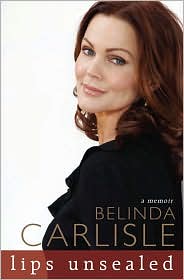Awhile back we promised to note Belinda Carlisle's Lips Unsealed: A Memoir. The excerpt above is from the book and it actually didn't work as a roundtable topic. Carlisle's bared her soul to write about eating disorders and drug addictions and the rock and roll life.

There are albums to record, road romances (INXS's Michael Hutchence: "He was a sexy, sensual man, with great eyes that didn't suck you in as much as they made you want to jump in.") to pursue, performance nightmares ("I couldn't make anything out, not the music or the audience. As I began singing 'Fading Fast,' I lost my hearing altogether. I sang anyway, but I couldn't get my key. My voice was all over the place. Jane glared at me, pissed off that I was that bad."), posing for an Annie Leibovitz cover shoot ("I have an idea," Annie said. "And I want you to hear me out before you say anything."), blowing off the Grammys ("We lost to Sheena Easton as Best New Artist, which didn't bum us out as much as it caused us to lose interest in the rest of the show, and so at the next commercial break we got up and left, which, as we later learned from the network, was a no-no."), touring with Cher, Green Day and many others, encountering out-of-it fellow celebrities (Charline Tilton, for one). Success and its opposite -- mediocrity. Failure will make you famous, will provide you with experiences. A so-so album (Talk Show) does little for your band or your career.
And always, food and drugs. Marilu Henner gets blown off when she calls Belinda out for drinking while pregnant (Belinda: "It took me sixteen years to admit this, but I had a glass of wine every day throughout my pregnancy.") As we write this, Rod Stewart's on the stereo singing "That Old Black Magic" which is rather appropriate. Rod pops up in the book and, right now, singing "I should stay away but what can I do?" sums up the push-pull/ attraction-repulsion Belinda is repeatedly caught in. In Rio for a concert with the Go-Gos, she goes off in search of drugs and encounters a dealer with bricks and bricks of cocaine. With a number one solo hit ("Heaven Is A Place On Earth"), a number two follow up ("I Get Weak") and another top ten hit ("Circle in the Sand," number seven), Belinda's obsessed with her weight: "Do I look fat? Am I fatter today than yesterday? Okay, forget that. Do I look fatter than I did this morning?"
Unflinchingly honest is a good way to describe the book, not embarrassed about the cycles she has to battle to break. Not embarrassed to note that she 'triumphed' many times only to discover there were more struggles to come.
In the darkest times, just coming out alive is a triumph and, in the end, Belinda's true art is the life she's carved out. A well known, around the world, band member and singer who can pick up a performance date anytime she wants, the freedom to pursue her solo recording art, a strong marriage (to Morgan Mason) and a young man (Duke) who truly is his mother's son.
